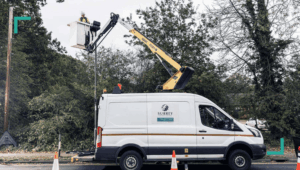Milestone Infrastructure, a part of M Group Services’ Transport Division, and Hampshire
County Council are proud to have won a second International Green Apple Environment
Award.
The award has been presented to Hampshire Highways, a partnership between Milestone
and Hampshire County Council, for its trial of bio-polymer bollards, replacing concrete
versions.
The bio-polymer product is derived from sugar cane, weighs around 4kgs and can be easily
transported, lifted and fitted into place.
Thanks to the ability of sugar cane to absorb CO2 as it grows, the bio-polymer bollards
generate a negative -1.0 kgCO2e/kg, compared to their 8.6kgCO2e/kg concrete counterparts.
Simon Watson, Business Director for Milestone Infrastructure, said: “We are extremely
proud this initiative has won an internationally recognised award.
“This would not have been possible without the support of Hampshire County Council who
consistently back our drive for improvement in key areas. We are continuing to work with
TMP Solutions on other innovative highways products which will assist us in the drive
towards net-zero.”
Councillor Nick Adams-King, Hampshire County Council’s Executive Member for Highways
Operations, said: “This is fantastic news. Our Hampshire Highways Carbon Strategy
includes a target to reach net-zero by 2050. We are always looking to innovate when it
comes to the use of materials and resources across highways maintenance.”
The Green Apple Awards are run by The Green Organisation, an international, independent,
non-profit, non-political environment group that began in 1994 to recognise, reward and
promote environmental best practice around the world. There were over 500 nominations for
the International Green Apple Awards this year, making this win even more impressive.
The Hampshire Highways team was awarded its first Green Apple Award in November 2021
for the Micheldever Recycling Facility, in collaboration with OCL Regeneration. The facility
reprocesses and recycles materials generated from road repairs for reuse in road
maintenance. The site itself has also been recycled, having previously been an asphalt plant
until the late 1990s. It enables Hampshire Highways to reduce carbon emissions, costs and
travel miles.
























